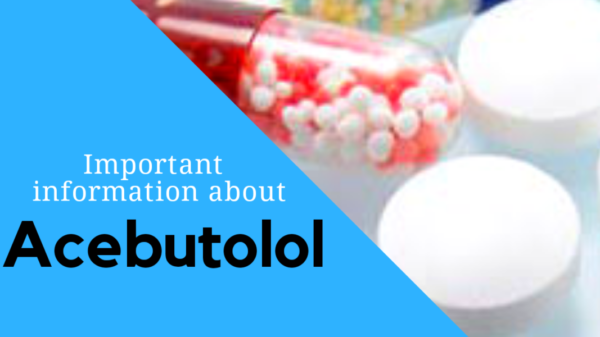Acebutolol is a selective beta-blocker with intrinsic sympathomimetic activity.
Thus, it is a preferred beta-blocker in patients with Asthma and Chronic obstructive pulmonary diseases.
It is primarily used to treat Hypertension, arrhythmias and angina pectoris.
Other selective beta-blockers commonly used are bisoprolol, atenolol, and carvedilol.
In cases of severe heart failure, obvious bradycardia, second- and third-degree heart blocks, and cardiogenic shock, beta-blockers should be avoided.
Acebutolol and alcohol:
- It increases the CNS depressant effects of alcohol.
- Patients may feel drowsy, dizzy, and become stuporous when taking alcohol while on acebutolol.
Acebutolol Overdose:
- It is considered as one of the most toxic beta-blockers.
- Significant QT prolongation and ventricular repolarization that is not usually seen with propranolol overdose have been reported. Acebutolol has resulted in deaths.
- It is therefore not used commonly in clinical practice.
Acebutolol Dosage in Angina and ventricular arrhythmias:
- Initially, 400 mg/day orally in 2 divided doses.
- The maintenance dose is 600-1200 mg/day in divided doses
- The maximum dose is 1200 mg/day
Acebutolol dosage in Hypertension:
- Oral: 400-800 mg/day
- The maximum dose: 1200 mg/day
Dosage in Chronic stable angina (unlabeled use):
- Oral: Usual dose: 400-1200 mg/day in 2 divided doses.
Acebutolol Dosage in renal disease:
Creatinine clearance of 25-49 mL/minute:
- Reduce dose by 50%.
Creatinine clearance of <25 mL/minute:
- Reduce dose by 75%.
Dose in Liver disease:
- Although the manufacturer does not provide dose adjustment in liver disease but it should be used with caution.
How to administer Acebutolol?
- It may be administered without regard to meals.
Pregnancy Risk Factor: C
Pregnancy Implications:
- Acebutolol crosses the placenta. Beta-blockers can cause fetal or neonatal bradycardia and hypoglycemia as well as respiratory depression, intrauterine Growth Restriction (IUGR), and small placentas.
- Additionally, pregnant women have a longer half-life for acebutolol. T
- his is a pregnancy-class C drug, so other agents may be better for hypertensive women.
Use during lactation:
- It is found in breast milk and is not usually recommended during breastfeeding.
Side effects of Acebutolol (Sectral):
- It can cause fatigue, edema, bradycardia, hypotension and congestive heart failure.
- It has also been associated with depression, abnormal dreams, dizziness, rash, and pruritis.
- Gastrointestinal adverse effects include diarrhea or constipation, nausea, flatulence, abdominal pain, and vomiting.
- Beta-blockers can cause impotence, myalgias, cough, wheezing, pharyngitis and intermittent claudication.
- Patients with diabetes should use beta-blockers with caution since they can disguise the symptoms of hypoglycemia.
- Additionally, it should not be used by people who have Raynaud's syndrome or peripheral arterial disease because it worsens their condition by generating peripheral vasoconstriction.
Mechanism of Action of Acebutolol:
- It competes with both beta 1 and beta 2 adrenergic receptors, although except in large dosages, it has little to no effect on beta 2.
- It contains intrinsic sympathomimetic and membrane-stabilizing properties.
- While beta-2 receptors are prevalent in the airways, beta-1 receptors are largely found in the heart and blood vessels.
- Non-selective beta-blockers inhibit the beta-receptors in the airways and may result in life-threatening asthma.
Onset of action is 1-2 hours
Duration of action is 12-24 hours
Up to 40% of the drug is absorbed when taken orally.
Time to peak action is 2-4 hours.
Excretion of acebutolol:
- 50% to 60% of it is excreted in the feces; 30% to 40% in the urine; the active metabolite is primarily excreted via urine.
Acebutolol Brand names:
- Acebutolol
- Rhotral
- Sectral
It is not available in Pakistan.




